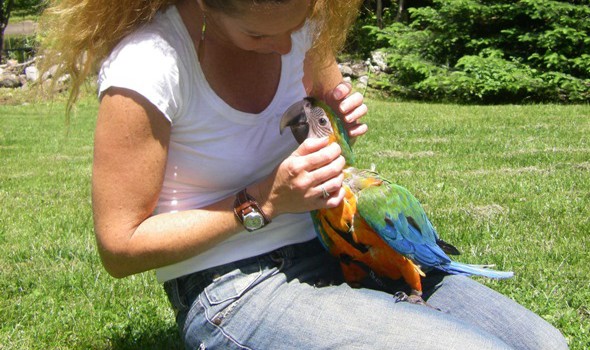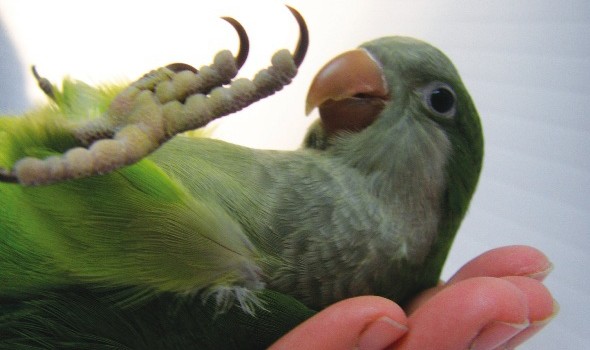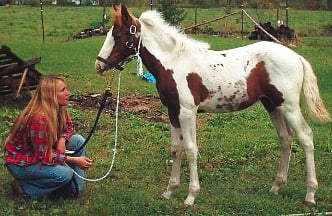
Parrots & Birds: Positive Reinforcement Training
Loving or Luring?
Dominance and respect are an on-going controversy in the animal and avian worlds. How far should we go to turn our pet bird into the perfect companion? What if we actually sat down and tried to think of it from a bird’s perspective?
Trust and respect are the cornerstones for a lasting and harmonious relationship. As a horse should be taught not to kick, a bird should be taught not to bite. As a horse is born with the ability to kick, a bird is born with the ability to bite. These are natural defenses and a form of communication. Yet in nature, they are not allowed to get out of hand. Other flock members will put each other in their place. Each bird respects the space of the other; throughout play, pecking order is established and maintained. If we watch birds in nature, we will see that they are fair in their ways; there are physical and vocal warning signs before an actual bite or attack!

As a herd member, a horse learns respect at a young age. A herd mare will send a rowdy young colt out into an open area away from the safety of the herd for a couple of hours. All the while keeping a close eye on him, so no harm will actually come to him. To the colt who stands alone, there is no feeling of safety at this distance. When the mare signals him to return, he will return quietly and respectfully join the herd again. As we do, a horse will continue to learn respect throughout his lifetime. A bird is a flock member in nature and therefore capable of learning respect as its survival depends on it.
A Member of Our Flock…
If we want our bird to become a member of our human-feathered flock, we must all respect the hierarchy. Establishing trust, a clearly defined understanding of the flock hierarchy, and learning respect are the most important things your bird will ever learn. You need to be able to take your bird out of the cage without fear, his or yours. It should respond to basic commands such as step up and down. It should permit and trust you to inspect its whole body, when necessary, in case of an emergency, or simply learn to mutually enjoy petting and preening sessions. We in turn need to respect what our bird is doing at the time we choose to play or train him. We often forget about the comfort of our bird when he is behaving perfectly. Running past his cage with flailing arms, as we attempt to get a slipper away from the dog, or opening the cage door at midnight to give your bird a hug. If a bird is fearful of someone or something, he should not be forced to interact without your presence. We must also respect the fact that a Cockatoo might scream at dusk, an Alexandrian will chew excessive amounts of wood and a budgie might never want to be petted in any way that ruffles his feathers.
Endless Possibilities
Everyone wishes for their African Grey to impress friends with a wonderful array of words. Others would love their cockatiel to be able to dunk a small ball into a basket on command. There are many different training methods available, your choice could be influenced by the species of bird you acquire and the relationship you have with your bird. Reinforcement training, clicker training, bridge training, etc… Nonetheless, all of these methods should follow established trust and respect. The most important part being, whichever method you choose, one rule applies to all; hurting your bird in anyway, mentally or physically, is unacceptable. Although there are physical warning signs, a bite can come as a very big shock. But striking or shaking your bird is out of the question.

Luring or Rewarding?
Affection and praise are great rewards provided there is a relationship of trust and respect established between and trainer and subject. In some parrot training videos, trainers do not use eye contact, or gentle reassuring words; instead they use devices such as chopped nuts or sunflower seeds to lure the bird. Is luring actually teaching? Isn’t it undermining the parrot’s intelligence and potential to learn what is expected of them? Treats are rewarding, assuming the bird has not been denied his regular food, although you can remove your bird’s favourite food from his regular food, to be kept for rewards, such as millet for a cockatiel, seeds for a parrot or fruit for a lory.
If a bird is either tired or hungry, or just not in the mood, sessions will be much less pleasant and beneficial for both of you. There is no justification for seemingly starving a bird, then luring him with chopped nuts or seeds. It is unethical to withhold food for an undetermined amount of time prior to a training session, in the hopes the bird will be so hungry he will readily accept any treat used to lure him into the desired behaviour. As the hungry bird seems to be willingly following a sunflower seed across a table, he is incapable of noticing his surroundings. The bird is in a trance. He is incapable of thinking at this point. This is both mental and physical abuse. This would make repetition training almost impossible. A starving bird will eagerly follow a sunflower into a dark carrying cage he is unfamiliar with. But if proper time is taken to gain the trust of the bird, he would enter with only praise as a reward. Waving a carrot in front of a starving horse and jumping on his back, does not mean he is trained, or even safe to ride, he is simply too hungry to care. When the carrot is gone, the problem persists. Birds are extremely affectionate creatures -some more than others. They are willing to learn, love and be nurtured. Repeated training is very good for your bird. But must be done when the bird is well rested, exercised, in a good mood and NOT starving. Excessive treating and luring is not a good idea, due to the fact that sessions should be kept short, yet be done quite frequently. Treats, such as sunflower seeds, are usually fatty and should not be overfed.
Just as good behaviour is rewarded, bad behaviour must be discouraged with a consistent response and quick reference. If our five-year-old child runs towards the road, must we calmly divert him with a lollipop? Will he assume he gets something fun next time he runs in the road? Negative reinforcement is sometimes necessary.
A firm “no,”- or a sudden “Ah, ah, ah” is usually enough to deter a bird from an unwanted behaviour – provided the fundaments of respect have been established early on.
If a bad behaviour, such as biting is allowed to go unpunished, you are jeopardizing your bird’s quality of life. Many birds are given away due to lack of respect that usually results in further behaviour problems.
Whether your bird is young or old, newly acquired, or a long-time family member, respect should be established. Refresher training should continue throughout the rest of the relationship as you would continue to teach a child.
Hierarchy, and dominance are natural occurrences in the circle of life. Whether we like it or not, we must be top dog when it comes to our birds. We must make sure we give them absolute guidance, firmly and positively, yet with great care and respect.
By Kevina Williams
 Kevina has been highly successful training young horses and horses with extremely bad vices, for the past fifteen years. She is now becoming an avid bird hobbyist. At the moment, she has six birds at home, as well as the numerous birds she works with daily at the HARI facility. Hoof or beak, mutual respect is imperative.
Kevina has been highly successful training young horses and horses with extremely bad vices, for the past fifteen years. She is now becoming an avid bird hobbyist. At the moment, she has six birds at home, as well as the numerous birds she works with daily at the HARI facility. Hoof or beak, mutual respect is imperative.


